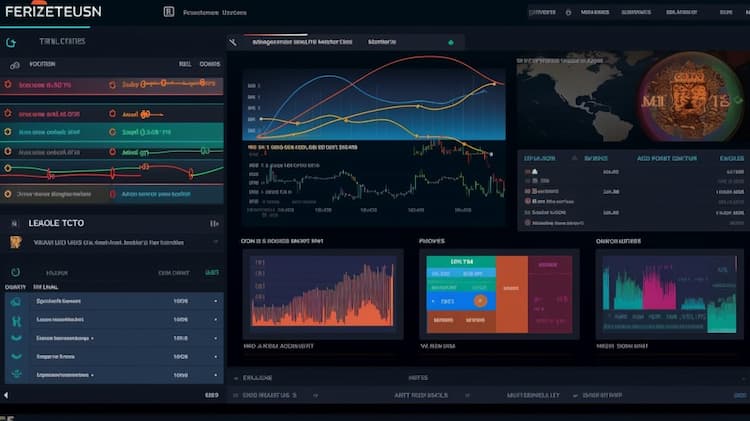
What does EZU means?
When it comes to navigating the world of finance, understanding the various financial instruments and investment options available is crucial. Exchange-traded funds (ETFs) have gained popularity among investors due to their flexibility and diversification benefits. In this article, we will explore the EZU ETF, answer common questions about it, and shed light on what EZU means.
EZU ETF: An Overview
The EZU ETF is a popular investment option for those interested in gaining exposure to European equities. EZU is the ticker symbol for iShares MSCI Eurozone ETF, managed by BlackRock. This ETF aims to track the performance of the MSCI EMU (European Economic and Monetary Union) Index, which consists of large and mid-cap companies from developed European countries. By investing in EZU, individuals can access a diversified portfolio of European stocks.
To better understand the EZU ETF, it's important to address some frequently asked questions.
What are the Key Characteristics of the EZU ETF?
The EZU ETF offers several notable features that make it an attractive investment option. Here are some key characteristics to consider:
Broad European Exposure: EZU provides investors with exposure to a wide range of companies in the European market. This allows for potential diversification benefits and the opportunity to capitalize on the region's economic growth.
Index Tracking: The fund aims to replicate the performance of the MSCI EMU Index, which is designed to represent the performance of the Eurozone equity market. By tracking this index, EZU investors can gain exposure to a benchmark that reflects the overall European market.
Liquidity and Accessibility: EZU is a highly liquid ETF, meaning it offers sufficient trading volume and tight bid-ask spreads. This liquidity ensures that investors can easily buy or sell shares at fair prices, enhancing the overall accessibility of the investment.
Expense Ratio: As with any investment, it's important to consider the expense ratio. The EZU ETF has a competitive expense ratio, which refers to the annual fee charged by the fund for managing the investment. This fee is deducted from the fund's assets and can impact overall returns.
 EZU overlap What does EZU means?
EZU overlap What does EZU means?
Why Consider Investing in the EZU ETF?
Investing in the EZU ETF can offer several potential benefits. Here are some reasons why investors may consider adding the EZU ETF to their portfolios:
Diversification: The EZU ETF provides exposure to a diversified portfolio of European stocks, allowing investors to spread their risk across various companies and sectors within the Eurozone.
Access to European Market: By investing in EZU, individuals can gain exposure to the European equity market without the need to research and select individual stocks. The ETF offers a convenient way to participate in the potential growth of the Eurozone economy.
Cost-Efficiency: ETFs generally have lower expense ratios compared to actively managed funds. The cost-efficiency of the EZU ETF can benefit long-term investors, as lower fees can potentially enhance overall investment returns.
To learn more about the benefits and potential risks of investing in the EZU ETF, it is recommended to consult with a financial advisor or conduct thorough research before making any investment decisions. This article does not provide any investment advisory services.
In conclusion, the EZU ETF provides investors with an opportunity to gain exposure to the European equity market through a single investment. With its broad European exposure, liquidity, and competitive expense ratio, the EZU ETF has become a popular choice among those seeking diversification within the Eurozone. However, it is important to conduct thorough research and seek professional advice before making any investment decisions. Understanding what EZU means and its key characteristics can help investors make informed choices about incorporating this ETF into their investment portfolios.
Disclaimer: This article does not provide any investment advisory services. The information provided is for educational purposes only and should not be construed as financial advice. Investors should consult with a qualified financial advisor before making any investment decisions.
Source 1: EZU issuer website Source 2: Reuters article about EZU
EZU quote and analysis
Discover the top holdings, correlations, and overlaps of ETFs using our visualization tool.
Our app allows you to build and track your portfolio.
To learn more about the EZU iShares MSCI Eurozone ETF, access our dedicated page now.
FAQ
What does EZU mean?
EZU is the ticker symbol for the iShares MSCI Eurozone ETF. It represents an exchange-traded fund that aims to track the performance of the MSCI EMU Index, providing investors with exposure to equities from the Eurozone countries.
Is EZU suitable for long-term investment?
The suitability of EZU for long-term investment depends on individual financial goals, risk tolerance, and market conditions. It is advisable to conduct thorough research, analyze the potential risks and rewards, and consider consulting with a financial advisor before making any long-term investment decisions.
Are there any alternatives to EZU for investing in the Eurozone?
Yes, there are alternative ETFs and investment options available for investing in the Eurozone. Some examples include other Eurozone-focused ETFs or mutual funds that provide exposure to European equities. It is recommended to compare the features, costs, and performance of different investment options and consider individual investment goals before making a decision.
What are the risks associated with investing in EZU?
Risks associated with investing in EZU can include general market risks, political and economic uncertainties within the Eurozone, currency exchange rate fluctuations, volatility in European stock markets, and risks specific to individual countries within the Eurozone. It is important to consider these risks and conduct thorough research before making investment decisions.
What is EZU?
EZU is an exchange-traded fund (ETF) that represents the iShares MSCI Eurozone ETF. It holds a portfolio of stocks from companies listed in the Eurozone countries, providing investors with exposure to the equity markets of the Eurozone.



